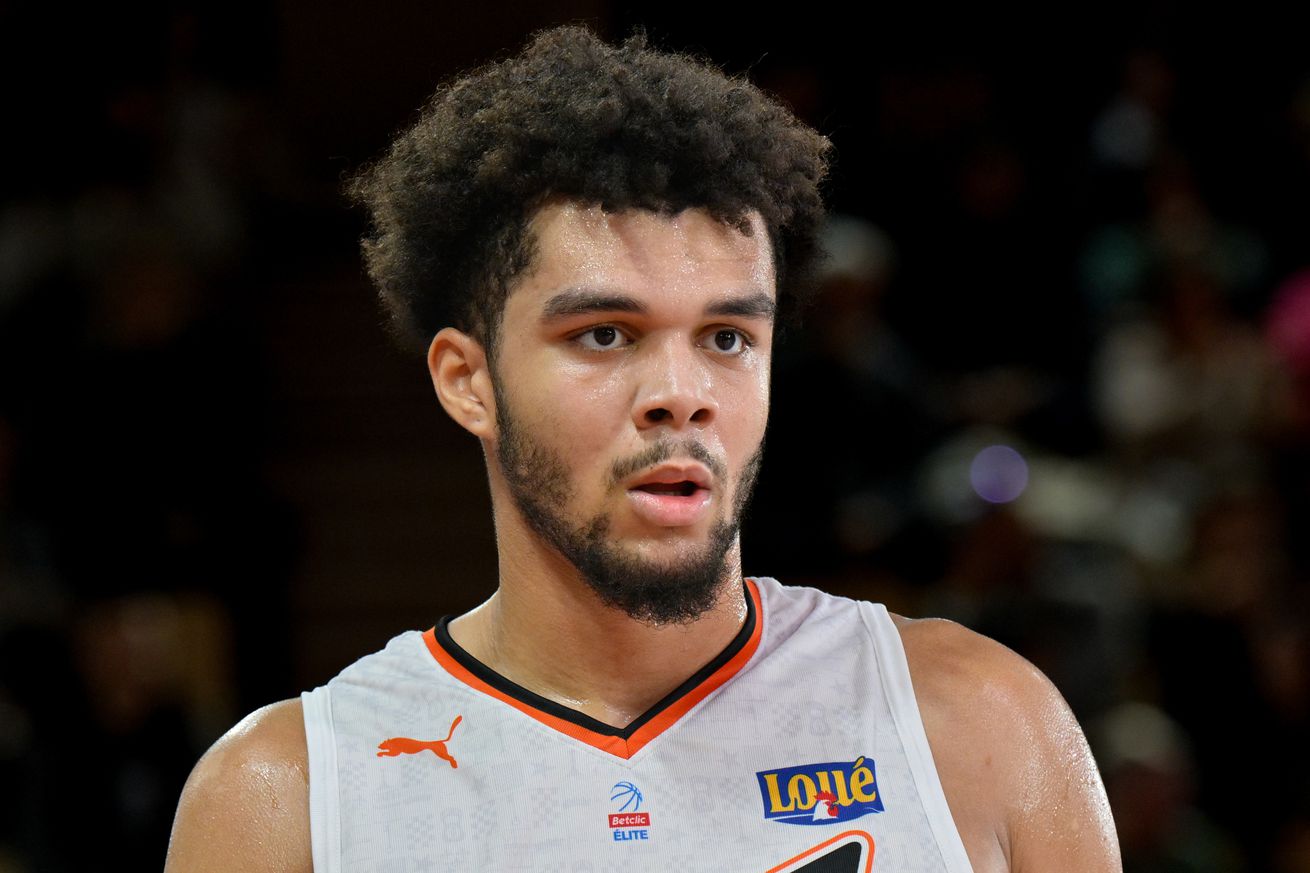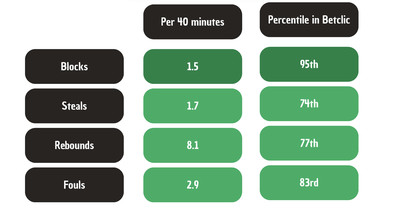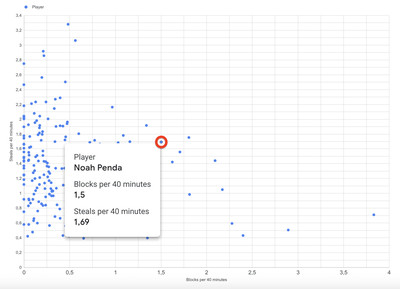
Noah Penda doesn’t need the ball to impact games. He cuts, connects, rebounds, rotates and defends with rare precision. For a Celtics team that values two-way versatility, the fit is easy to see.
With the draft coming up soon and the french basketball season coming to an end, the timing is perfect to study Noah Penda’s potential as a new Celtic. Le Mans Sarthe Basket winger was voted Betclic Élite’s best young player of the season on Wednesday. He follows in the footsteps of Zaccharie Risacher and Victor Wembanyama, the first picks of the last two drafts.
He is projected to go in the second part of the first round and could be a great pick for the Boston Celtics if they want to add defensive playmaking and connecting tissue on offense. As the Celtics end the season with the 24th-ranked opponent turnover rate and the 3rd-lowest transition volume, Noah Penda could bring another alternative to Mazzulla-ball.
Ready to win
His coach, Guillaume Vizade, who has worked with him in various contexts (in his previous club and for the French national under-20 team), believes a winning environment like the Celtics is well suited to his personality:
“As he’s a competitor and very committed to the team project, I think an already successful team looking for a player who can improve on what already exists would be a good fit. He’s able to adapt constantly thanks to his basketball IQ, and will always find a way to help the team and boost the productivity of its line-ups.”
As Jrue Holiday might be traded, and Al Horford not getting any younger, the Celtics will need to find elite defenders to replenish the roster. What if the young man was the defensive prospect they could place a bet on? At 6’8” with a 7-foot wingspan, Penda might be one of the best defensive players in this draft, as he is already the top defensive playmaker in the French league. His current coach believes his body is ready for the big league:
“Physically, he has many of the attributes of a modern NBA winger. His measurements, his power and his ability to move to the right place at the right time (counter-timing, lateral speed to hold off duels). His physical assets could make him a Swiss army knife defensively in the NBA and a connector offensively. The final element that I find reassuring is that he has not stopped progressing so far. I think this progression will continue in the ultra-competitive environment of the NBA.”
Now that you know what his coach thinks about him, let’s look at what the statistics and film have to say.
One of a kind
With a large enough statistical sample now available to compare player performances, it’s easier to spot the outliers — those who clearly stand out from the pack. Noah Penda is one of them.
During the 2024–2025 season with Le Mans in Betclic Élite, he delivered a defensive performance that no one else has matched. His raw stats aren’t always eye-catching because of his versatility and the fact that he plays 26 minutes per game. But once you adjust for playing time and compare him to the rest of the league, he becomes truly unique.
If you focus on the key defensive stats — blocks, steals, rebounds, and fouls — his overall impact is the best in the league.

Normalizing the numbers to 40 minutes for all Pro A players smooths out the influence of playing time. Per 40 minutes, Noah Penda averages 1.5 blocks, 1.7 steals, 8.1 rebounds, and just 2.9 fouls.
So who else in Betclic Élite combines this level of production and defensive efficiency? No one. Nobody brings this kind of impact on that side of the ball. The only two players who come close to his efficiency are Andre Roberson (the former OKC Thunder player) and Kevarrius Hayes, but both foul a lot more.

His defensive presence also makes him one of the league’s best at triggering transition opportunities — helping Le Mans pressure opposing offenses and defenses alike. Another marker of his impact? He’s among the players defending the most isolations per game. That kind of volume shows he’s frequently matched up with the opponent’s top scorer.
Even better, when opposing scorers finish a play in isolation against Noah Penda, they only convert 27% of their attempts. How is that possible? Because he can guard various profiles — from very quick point guards to post-up big men.
Opposing scorers have an astounding 27.3% FG (!) when guarded by Noah Penda in isolation.
The multi-positional defending, lateral quickness, physicality & overbearing length — these are the makings of an All-NBA defender & Penda fits that bill. pic.twitter.com/mYBtK5GmWf
— Mohamed (@mcfNBA) April 21, 2025
Here’s one example: Penda is guarding one of the best point guards in the league. On paper, a player with Noah’s size shouldn’t be able to keep up with that kind of speed. But he’s built differently. His mobility, size, and density make him an elite defender in multiple roles.
In the play above, he defends a quick ball-handler in transition — a rare skill for a player at his position. But that’s not the limit of his versatility. In the next action, he starts in the weak-side corner and, after a pick-and-roll, rotates perfectly to take away an easy layup at the rim.
He quickly recognizes the next threat coming from behind and uses his unique physical tools to block the shot with one hand.
You’ll even find sequences like the one below where he does both in the same possession. First, his help at the rim forces the offense to swing the ball to the corner. He rotates, switches to the ball-handler, stays in front, and when it seems like he’s about to get blown by, his wingspan and hand-eye coordination allow him to block the shot.
Noah Penda’s defensive influence is as versatile as it is disruptive — and a huge part of why his team can run in transition. In today’s game, where pick-and-rolls dominate, Penda is built to blow them up. He’s mobile and strong enough to guard either the ball-handler or the screener. And once the scoring threat is neutralized, his length makes passes far tougher to execute.
Even when he’s off the ball, his presence alone complicates passing lanes in tight spaces. He reads the game well and can afford to gamble or float between two players because he won’t get beat easily. On top of that, he’s confident enough with the ball in his hands to push the break and make smart decisions in transition.
In a league where spacing is everything, a profile like Noah Penda’s might be the key to building a great defense. Take this play, for example: he’s defending a player just one pass away from the ball, but he still manages to slide over, disrupt the drive, and shut it down thanks to his exceptional timing and physical tools.
The other upside to his game comes right after his defensive ability. He is able to get stops, indeed, but he can also grab the rebound and carry the ball in transition. As mentioned earlier, he grabs more rebounds per 40 minutes than 80% of the Betclic Élite players. That’s already really impressive. But the real value comes from his ability to dribble and pass to launch the transition.
The numbers say it clearly — Noah Penda is a one-of-a-kind defender in France, maybe even in Europe. Across all European leagues, very few players post this kind of defensive output with so few fouls. His mix of sharp instincts, elite coordination, length, and mobility could make him one of the most versatile defenders in the world. But what about his offense?
Can he be a connector in the nba?
The offense is the biggest question mark. What could be a great upside is his connecting, his passing, and his capacity to read the game. His great basketball IQ — which is highlighted by his defense — also impacts the other side of the court. He can pass on the move, which could be great as a roll-man or in a secondary ball-handler role. Like Luke Kornet, he can also be a stationary offensive hub thanks to his ability to read plays and find the open man. Overall, he is a willing and good passer. As he ranks in the 59th percentile in assists per 40 minutes among wings, it shows how much of a team player he is.
While the passing seems to be his biggest upside on offense, he’s also great at cutting, ranking in the 70th percentile for “cuts made per 40 minutes.” This is not a surprise, as we often see how smart players excel at cutting, passing, and reading the game. Penda is one of them.
Offensively, he can also drive and play with his back to the basket, ranking in the 70th percentile in post-up attempts per 40 minutes in the French league. As the Celtics like to attack mismatches, he could also bring some slight offensive creation from the post-up against weaker defenders.
So why wouldn’t it work? Mainly because of the shooting. He’s improved a lot, and insights from Le Mans coaching staff suggest that he is very serious and cautious about his shooting training. And the numbers back up this impression. His free throw percentage went from 55% in 2021 to 72% this season. Same with his 3-point efficiency, improving from 24% to 34% over four years. But will it be enough to play in the NBA? One thing is certain: his work ethic is strong. When we asked Coach Vizade about it, here’s what he had to say:
“Noah is a player who is very consistent in his work and commitment, and this translates into regularity in his productions. As well as being consistent every year, he’s making progress in the way he trains. His intentions progress along with his determination and over the three years I’ve always had a player with a thirst for learning and evolving on a daily basis. He also connects well with his partners and makes sure he’s always supporting them on both sides of the court.”
If he can reach league-average efficiency on shooting in his first seasons, Penda will be able to stay on the court and become one of the most impactful two-way role players. His ability to play a wide variety of roles on both offense and defense fits perfectly in the modern game. At just 20 years old, he has already proven he can be part of a winning environment — and his teams are often at their best when he’s on the court (66th percentile in plus/minus this season).
Noah Penda will have an instant impact on the team that drafts him. Defensively, he’ll be easy to plug into various coverages. Offensively, he can pass, cut, screen, and move without the ball — or create chaos in transition. What more can you ask for from a rookie in a winning team looking to retool for the future? With most of the other Celtics already elite shooters, he could bring something different. Penda could offer what Holiday gave the Celtics on the defensive end and find a role off the ball on offense.